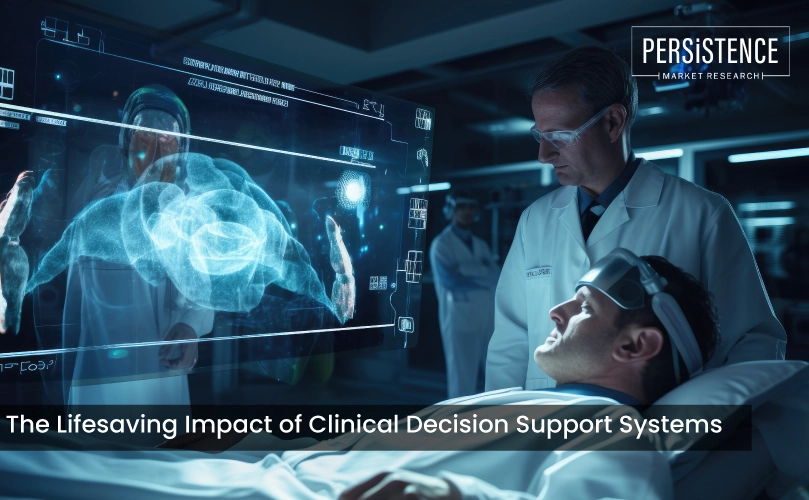- Blog
- Clinical Decision Support System
The Lifesaving Impact of Clinical Decision Support Systems
Published On : 26 Nov 2024
In the complex and high-stakes world of healthcare, where every decision can have profound implications for patient outcomes and healthcare economics. Clinical decision support systems (CDSS) have emerged as a transformative technology that is fundamentally reshaping medical practice by enhancing clinical judgment, reducing medical errors, and optimizing resource allocation.
CDSS, introduced in the 1980s, have evolved into key components of electronic medical records, though their impact on costs and patient outcomes is still uncertain. At the point of care, clinical decision support systems are computerized programs that give medical professionals evidence-based, real-time advice. Better patient outcomes and lower healthcare costs result from these technologies' contributions to patient safety, treatment plan optimization, and the reduction of medical mistakes.

Transforming Healthcare with Clinical Decision Support Systems
Clinical decision support systems are sophisticated digital tools designed to assist healthcare professionals in making informed, evidence-based decisions. These advanced platforms integrate extensive medical knowledge, patient-specific data, and sophisticated algorithms to provide real-time guidance during clinical workflows.
In dentistry for example, CDSS utilizes clinical knowledge to analyze patient data, helping dental professionals make decisions regarding diagnosis, prognosis, treatment, and disease prevention.
The technological foundation of CDSS is multifaceted, combining complex medical databases with advanced machine-learning algorithms. These systems leverage real-time data analysis capabilities, incorporating advanced predictive modeling techniques and deeply integrating with electronic health records (EHR). Such comprehensive approach allows for a nuanced, intelligent approach to healthcare decision-making.
Innovations in the Clinical Decision Support Systems
- In January 2023, Memorial Sloan Kettering Cancer Center implemented an advanced CDSS that demonstrated remarkable precision in oncological treatments. The system utilized AI-powered algorithms to analyze genetic markers and treatment responses, resulting in a 22% improvement in personalized chemotherapy protocols.
- By combining real-time patient monitoring and genetic data processing, Mayo Clinic's CDSS, which was introduced in September 2023, allowed for more focused treatments for complicated chronic illnesses.
- In the midst of global pandemic's ongoing management, the CDC collaborated with several technology firms to develop CDSS platforms that track emerging variants and recommend adaptive treatment strategies.
- In March 2024, a breakthrough CDSS developed by Johns Hopkins University demonstrated the ability to predict potential long-COVID complications with 85% accuracy, allowing for proactive patient management.
How CDSS Save Lives
- Reducing Medical Errors
In the healthcare industry, medical errors are a key problem that frequently have adverse consequences. To reduce such hazards, CDSS makes use of cutting-edge technology infrastructure. By identifying any negative effects, they ensure patient safety through automated drug interaction assessments.
CDSS creates advanced algorithmic diagnostic frameworks that offer accurate direction during critical diagnoses. They also do thorough patient risk assessments for preventative interventions and produce evidence-based therapy recommendations customized for each patient.
CDSS ensures uniformity in the provision of care by enforcing defined clinical practices. Clinical decision-making and patient outcomes are greatly improved by CDSS's integration of these features.
- Early Disease Detection
Modern versions of CDSS have reshaped preventative healthcare by integrating powerful data analytics and machine learning. By analyzing complex patient data patterns, these intelligent tools can detect possible illness risks before symptoms appear.
Early identification of health hazards enables CDSS to offer focused preventative tests for prompt actions. Such systems flag subtle changes in health trends, providing early warnings that might go unnoticed. They offer personalized risk stratification, tailor preventive measures to individual patients, and support proactive healthcare interventions.
CDSS empowers healthcare providers to deliver precise, timely, and effective preventive care, ultimately improving patient outcomes and reducing the burden of chronic diseases.
- Emergence of Precision Medicine
The emergence of precision medicine has seen remarkable growth, largely fueled by the advancements in CDSS. Such sophisticated systems utilize vast amounts of data to analyze individual genetic profiles, allowing healthcare providers to make informed decisions about targeted therapies.
By employing CDSS technologies, providers can predict potential treatment responses based on genetic markers, which aids in developing personalized treatment plans.
Stanford University's precision medicine CDSS system, unveiled in February 2024, has shown a 35% reduction in chemotherapy-related side effects through genetic-guided interventions. Consequently, enhancing personalized cancer treatment and improving patient quality of life by tailoring therapies based on individual patient genetics.
Cost Reduction Mechanisms
- Boosting Operational Efficiency
Clinical decision support systems improve healthcare efficiency by streamlining operational workflows, reducing unnecessary diagnostic tests and redundant procedures, and optimizing treatment pathways. They ensure effective and timely interventions for patients, lower hospital readmission rates, and improve resource allocation, thereby enhancing patient care and reducing readmission rates.
According to research published in the Journal of Healthcare Management, hospitals that adopted complete CDSS had an average 18% decrease in operating expenses, underscoring the financial advantages and potential to raise the standard of patient care.
- Trimming Administrative Costs
For both consumers and healthcare providers, healthcare administrative costs represent a substantial financial burden, making up 25 to 30% of medical expenses. By automating paperwork, establishing uniform billing practices, providing effective coding suggestions, and guaranteeing regulatory compliance, CDSS platforms help lessen this strain.
In order to streamline claim processing and speed up payments, they also incorporate insurance claim management features. These solutions lower the possibility of mistakes or fines while assisting healthcare businesses in maintaining compliance with legal regulations.
Transformative Power of Clinical Decision Support Systems
Through the integration of cutting-edge algorithms, medical expertise, and real-time data analysis, clinical decision support systems are transforming healthcare. From predicted chronic illness management to individualized therapies, these tools are revolutionizing the way that patient care is delivered. Their enormous potential is demonstrated by implementations at top medical facilities.
With the promise of saving lives, cutting expenses, and improving patient outcomes, healthcare companies investing in CDSS embrace a new approach to medical practice.
Industry Report

Request Report Sample
Your privacy is important to us; your data is secure
Contact Us
Latest Reports
-
Baby Powder Market by Ingredient Type (Talc-based, Talc-free), Packaging Type (Plastic Bottles, Sustainable/Eco-tins, Sachet/Pouches, Others), Distribution Channel (Offline, Online), and Regional Analysis 2026 – 2033
-
Duck boots market by Product Type (Insulated Duck Boots, Waterproof Duck Boots, Fashion Duck Boots, Thermal Lined Duck Boots), Material (Rubber, Leather, Textile, Combination Materials), End-user (Men, Women, Kids), and Regional Analysis for 2026 – 2033
-
Extruded Polylactic Acid (PLA) Fiber Market by Fiber Type (Monofilament PLA Fiber, Multifilament PLA Fiber, Staple PLA Fiber, Tow PLA Fiber, Specialty PLA Fiber), Grade (Standard Grade, High-Performance Grade, Bio-modified/Enhanced Grade), End-user, and Regional Analysis, 2026 - 2033
-
Tea-Based Skin Care Products Market by Tea Type (Green Tea, Black Tea, Others), Product Form Type (Creams & Lotions, Serums, Cleansers & Masks), Application (Facial Care, Body Care, Others), and Regional Analysis 2026 - 2033
-
North America eVTOL Aircraft Lift Technology (Vectored Thrust, Multirotor, Lift Plus Cruise), Mode of Operation (Piloted, Autonomous, and Semi-Autonomous), Range (0-200 Km, and 200-500 Km), Maximum Take-off Weight (MTOW) (<250 Kg, 250-500 Kg, 500-1500 Kg, and >1500 Kg), Application (Commercial, Military, and Emergency Medical Service), Propulsion Type (Battery-Electric, Hybrid-Electric, and Hydrogen-Electric) Analysis for 2026 - 2033
